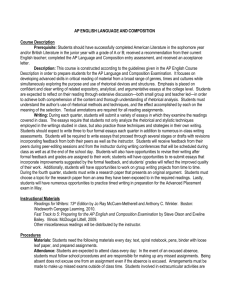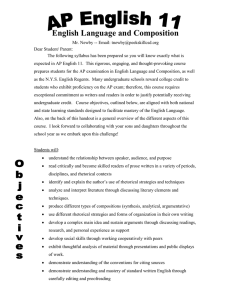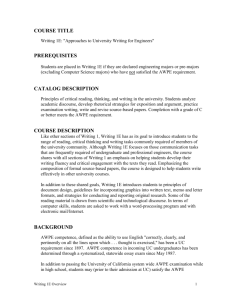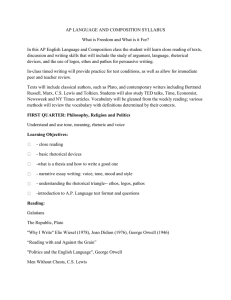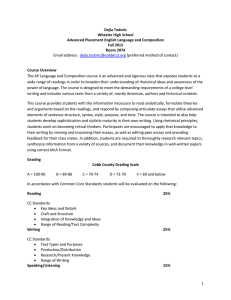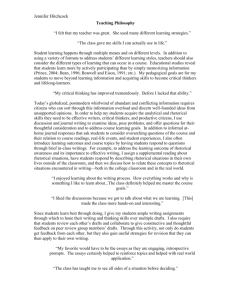Uhl AP Language Syllabus 2014-2015
advertisement
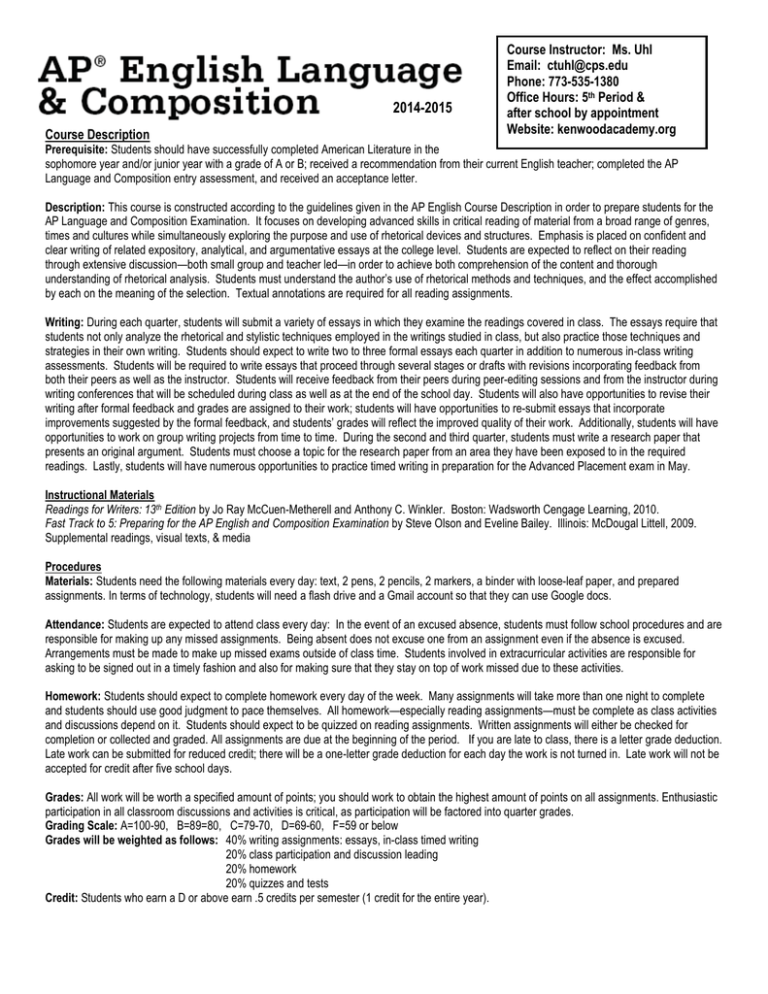
2014-2015 Course Description Course Instructor: Ms. Uhl Email: ctuhl@cps.edu Phone: 773-535-1380 Office Hours: 5th Period & after school by appointment Website: kenwoodacademy.org Prerequisite: Students should have successfully completed American Literature in the sophomore year and/or junior year with a grade of A or B; received a recommendation from their current English teacher; completed the AP Language and Composition entry assessment, and received an acceptance letter. Description: This course is constructed according to the guidelines given in the AP English Course Description in order to prepare students for the AP Language and Composition Examination. It focuses on developing advanced skills in critical reading of material from a broad range of genres, times and cultures while simultaneously exploring the purpose and use of rhetorical devices and structures. Emphasis is placed on confident and clear writing of related expository, analytical, and argumentative essays at the college level. Students are expected to reflect on their reading through extensive discussion—both small group and teacher led—in order to achieve both comprehension of the content and thorough understanding of rhetorical analysis. Students must understand the author’s use of rhetorical methods and techniques, and the effect accomplished by each on the meaning of the selection. Textual annotations are required for all reading assignments. Writing: During each quarter, students will submit a variety of essays in which they examine the readings covered in class. The essays require that students not only analyze the rhetorical and stylistic techniques employed in the writings studied in class, but also practice those techniques and strategies in their own writing. Students should expect to write two to three formal essays each quarter in addition to numerous in-class writing assessments. Students will be required to write essays that proceed through several stages or drafts with revisions incorporating feedback from both their peers as well as the instructor. Students will receive feedback from their peers during peer-editing sessions and from the instructor during writing conferences that will be scheduled during class as well as at the end of the school day. Students will also have opportunities to revise their writing after formal feedback and grades are assigned to their work; students will have opportunities to re-submit essays that incorporate improvements suggested by the formal feedback, and students’ grades will reflect the improved quality of their work. Additionally, students will have opportunities to work on group writing projects from time to time. During the second and third quarter, students must write a research paper that presents an original argument. Students must choose a topic for the research paper from an area they have been exposed to in the required readings. Lastly, students will have numerous opportunities to practice timed writing in preparation for the Advanced Placement exam in May. Instructional Materials Readings for Writers: 13th Edition by Jo Ray McCuen-Metherell and Anthony C. Winkler. Boston: Wadsworth Cengage Learning, 2010. Fast Track to 5: Preparing for the AP English and Composition Examination by Steve Olson and Eveline Bailey. Illinois: McDougal Littell, 2009. Supplemental readings, visual texts, & media Procedures Materials: Students need the following materials every day: text, 2 pens, 2 pencils, 2 markers, a binder with loose-leaf paper, and prepared assignments. In terms of technology, students will need a flash drive and a Gmail account so that they can use Google docs. Attendance: Students are expected to attend class every day: In the event of an excused absence, students must follow school procedures and are responsible for making up any missed assignments. Being absent does not excuse one from an assignment even if the absence is excused. Arrangements must be made to make up missed exams outside of class time. Students involved in extracurricular activities are responsible for asking to be signed out in a timely fashion and also for making sure that they stay on top of work missed due to these activities. Homework: Students should expect to complete homework every day of the week. Many assignments will take more than one night to complete and students should use good judgment to pace themselves. All homework—especially reading assignments—must be complete as class activities and discussions depend on it. Students should expect to be quizzed on reading assignments. Written assignments will either be checked for completion or collected and graded. All assignments are due at the beginning of the period. If you are late to class, there is a letter grade deduction. Late work can be submitted for reduced credit; there will be a one-letter grade deduction for each day the work is not turned in. Late work will not be accepted for credit after five school days. Grades: All work will be worth a specified amount of points; you should work to obtain the highest amount of points on all assignments. Enthusiastic participation in all classroom discussions and activities is critical, as participation will be factored into quarter grades. Grading Scale: A=100-90, B=89=80, C=79-70, D=69-60, F=59 or below Grades will be weighted as follows: 40% writing assignments: essays, in-class timed writing 20% class participation and discussion leading 20% homework 20% quizzes and tests Credit: Students who earn a D or above earn .5 credits per semester (1 credit for the entire year). Course Outline Quarter 1: Introduction to Rhetoric & Argumentation Readings: Freakonomics by Steven D. Levitt and Stephen J. Dubner “Lights of the Long Night” by Andre Dubus “Shooting an Elephant” by George Orwell “In the Name of the Law: How to Win Arguments without Really Trying” by Richard Conniff “What does Islam Say About Terrorism?” by Abdullah Momin “Postscript” to Inside the Kingdom: My Life in Saudi Arabia by Carmen Bin Laden “Drugs” by Gore Vidal “Don’t Legalize Drugs” by Morton M. Kondracke “The Libido for the Ugly” by H.L. Mencken Writing Skills: Review of essential English grammar including skills for editing and revising written work Building vocabulary for analyzing texts by creating term glossary Introduction to rhetorical methods and techniques: audience, purpose, & writing as a process Crafting paragraphs: paragraph patterns, characteristics of well-designed paragraph Argumentation and persuasion: what they do, when to use them, and how to use them Taking a clear position, addressing a counterargument, supporting ideas with evidence Language/Test Strategies: the basic exam construction, an overview of the multiple-choice questions, an overview of the essay questions, information on scoring, taking a diagnostic test, reviewing the diagnostic test, building tone vocabulary Quarter 2: Synthesizing Ideas & Sources Readings: “Body Image” by Cindy Maynard “Stretch Marks” by Anna Quindlen “No Technology? No Problem” by Eric Brende “OMG! If LOL, then KMN!” by Mary Kolesnikova Synthesis readings Visual texts Writing Skills: Research paper process: topic selection, thesis statement proposal, conducting research, organization and use of primary and secondary sources, presenting an argument that includes the synthesis of ideas from both types of sources, drafting, employing MLA and APA style and proper documentation, preparing work cited Research paper required steps: thesis statement proposal, note taking on explanation and characteristics of argumentation, individual conferencing on thesis proposal and lines of defense, completion of bibliography and research note cards, individual conferencing following feedback on writing process (to be repeated several times), completion of the final draft. Description in writing: what is does, when to use it, and how to write it Process analysis writing: what it does, when to use it, and how to write it Illustration and exemplification in writing: what it does, when to use it, and how to write it +Various readings (both primary and secondary sources) for research as students are required to choose an area of interest from those to which they have been exposed in the required readings studied in class. Students are expected to complete investigative research and arrive at an original assertion or thesis statement, which they will fully explore and support with the use of these readings. Language/Test Strategies: in-depth look at the synthesis essay question and sources, review argumentation, focus on complex analysis of sources and counter-argument, selecting appropriate evidence, using research material, organizing and taking notes for research, incorporating and using quotations effectively, full practice tests followed by explanations and review. Quarter 3: Rhetorical Analysis Readings: “Why Don’t We Complain?” by William F. Buckley, Jr. “A Nation in Need of Vacation” by Steve Rushin “I Want a Wife” by Judy Brady “I Have a Dream” by Martin Luther King, Jr. “The Company Man” by Ellen Goodman “Just Walk on By: Black Men and Public Space” by Brent Staples Writing Skills: Approaches to writing a rhetorical analysis, including suggestions for what to avoid and for discussing rhetorical devices Understanding writer’s voice: vocabulary, syntax, & tone Thesis formulation: key words, characteristics of a good thesis, errors to avoid Organizational strategies: listing supporting material, using formal outlines AP scoring rubric Combining the rhetorical modes Language/Test Strategies: in-depth look at the multiple-choice questions including how to prepare, answer, and attack multiple-choice questions; recognizing syntactical devices understanding the scoring rubric; more practice questions Quarter 4: Reviewing for the AP Exam & Memoir Readings: “Of Altruism, Heroism, and Nature’s Gift’s in the Face of Terror” by Natalie Angier “Heaven: Nothing to Write Home About” by Jack Smith “Hollywood’s Heaven and Hell” by Todd Hertz “Move Over, Teams” by Paul M. Muchinsky “Thinking as a Hobby” by William Golding “Kinds of Discipline” by John Holt “The Idols” by Francis Bacon “English 101” by Bart Edelman The Glass Castle by Jeanette Walls Writing Skills: More patterns of organization and the study of what rhetorical mode each does, when to use it, and how to use it: Definition Comparison and contrast Division and classification Causal analysis Language/Test Strategies: in-depth look at the multiple-choice questions including how to prepare, answer, and attack multiple-choice questions; recognizing syntactical devices understanding the scoring rubric; more practice questions on archaic prose, focus on reviewing previous exam questions *This syllabus is subject to change. Please refer to specific calendars and the course website for updates and additions to the syllabus.
